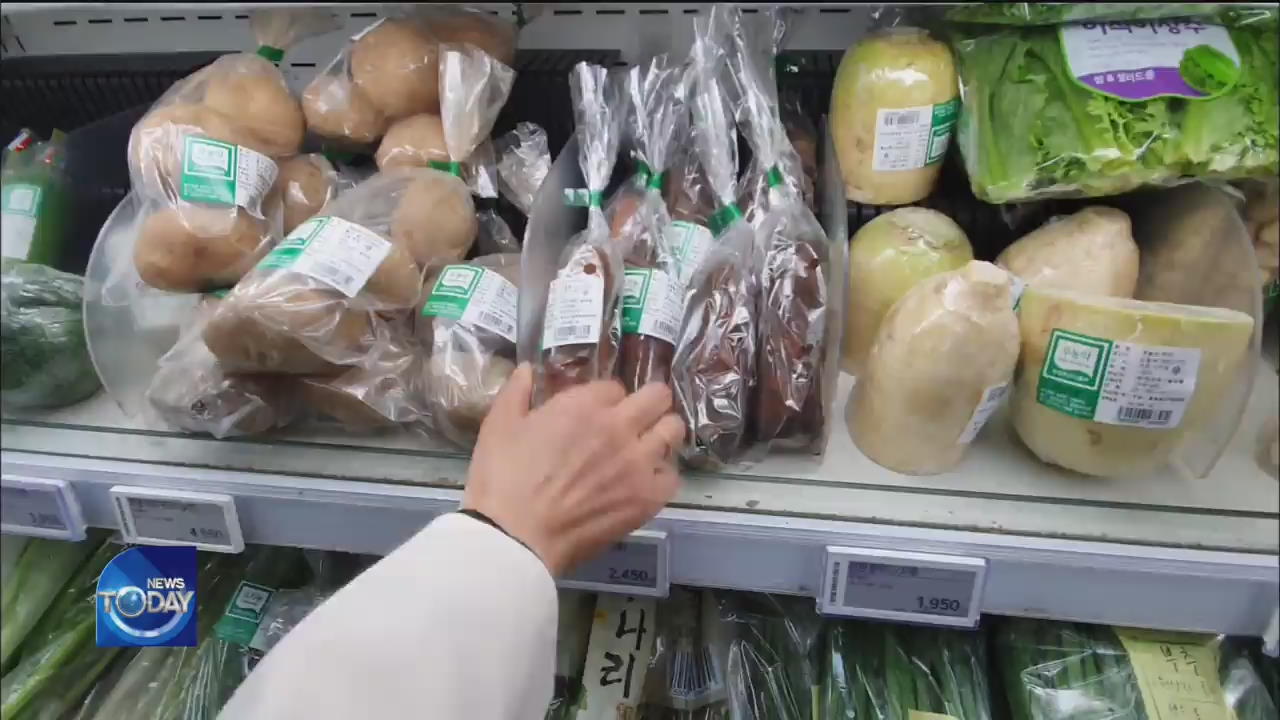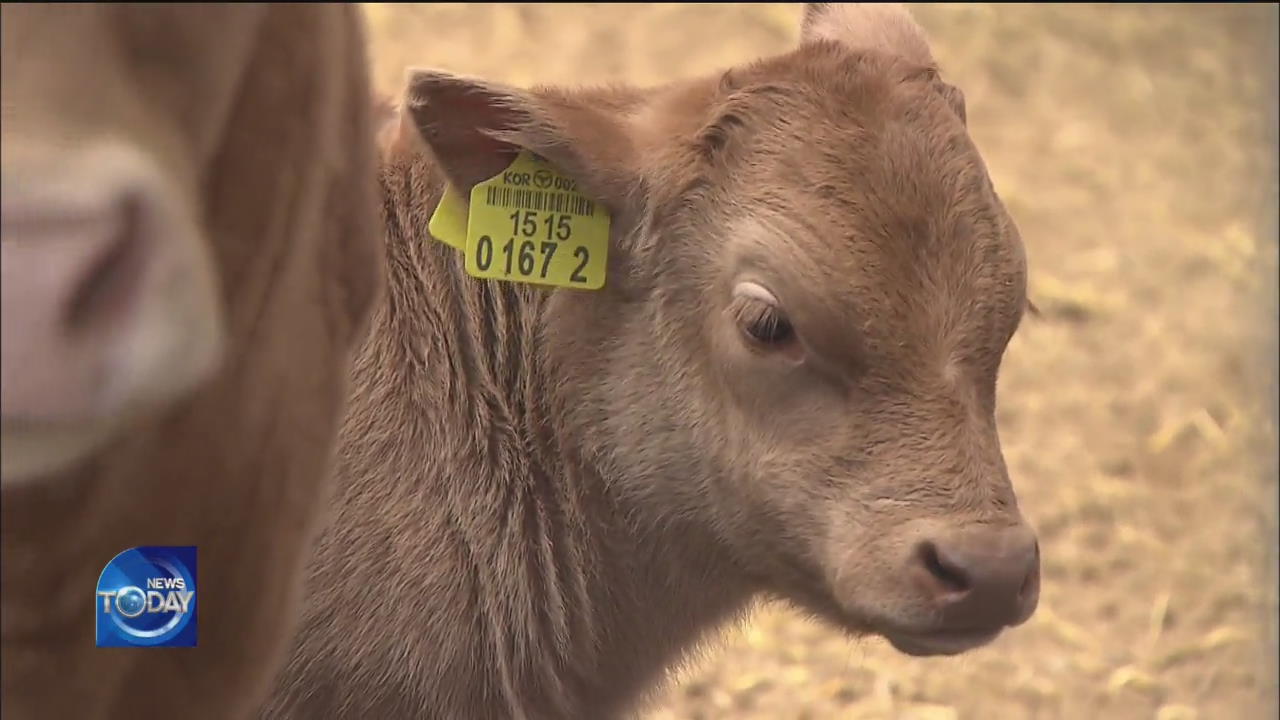DIFFICULTIES IN CUTTING PLASTIC CONSUMPTION
입력 2020.04.23 (15:13)
수정 2020.04.23 (16:45)
읽어주기 기능은 크롬기반의
브라우저에서만 사용하실 수 있습니다.
[Anchor Lead]
Yesterday marked the 50th Earth Day, which was first celebrated to demonstrate support for environmental protection. With the public becoming more active in seeking ways to protect the environment, some even bring their own containers at supermarkets to cut plastic consumption. But customers often face obstacles that's hard to overcome just with individual efforts. Here's why.
[Pkg]
[Soundbite] RYU JUN-YEOL(ACTOR) : "No pre-packaging is needed if we use personal containers when shopping for fruits and vegetables."
This video encourages shoppers to bring their own container to help reduce waste produced from packaging. Is plastic-free grocery shopping possible? A KBS team followed a group of environmental activists on a mission. At a large, discount store, only carrots and potatoes were not pre-packaged. When buying pork, they tried to use their own containers but it didn't work out.
[Soundbite] "Do you have only pre-packaged ones? Can't I buy the unpackaged one over there? (No, This is our new guideline.)"
The proportion of pre-packaged products is higher at supermarkets than at discount chains. Each apple is double-packaged. Quite excessive. But at traditional markets, shoppers can use personal container and purchase unpackaged items.
[Soundbite] "Use this one please. No plastic bag."
Here is a collection of packaging materials. 15 pieces of plastic waste were left from shopping at a discount store chain, 19 from a supermarket and only one from a traditional market. Other studies conducted by multiple environmental groups produced similar results. Among the 40 selected items, large discount stores and supermarkets sell pre-packaged products at a greater proportion than traditional markets.
[Soundbite] GOH GEUM-SOOK(ENVIRONMENTALIST) : "It takes more than consumer efforts to make plastic-free shopping possible. It is frustrating to throw away plastic waste anyway."
In order to reduce waste from excessive packaging, distributors should play their part by selling more products unpackaged. It is also necessary to introduce a zero plastic system that allows shoppers to use their own containers. Large discount stores and producers claim pre-packaging is convenient for consumers. According to a survey, five out of ten consumers answered they sometimes had to exchange their purchases due to unnecessary packaging.
Yesterday marked the 50th Earth Day, which was first celebrated to demonstrate support for environmental protection. With the public becoming more active in seeking ways to protect the environment, some even bring their own containers at supermarkets to cut plastic consumption. But customers often face obstacles that's hard to overcome just with individual efforts. Here's why.
[Pkg]
[Soundbite] RYU JUN-YEOL(ACTOR) : "No pre-packaging is needed if we use personal containers when shopping for fruits and vegetables."
This video encourages shoppers to bring their own container to help reduce waste produced from packaging. Is plastic-free grocery shopping possible? A KBS team followed a group of environmental activists on a mission. At a large, discount store, only carrots and potatoes were not pre-packaged. When buying pork, they tried to use their own containers but it didn't work out.
[Soundbite] "Do you have only pre-packaged ones? Can't I buy the unpackaged one over there? (No, This is our new guideline.)"
The proportion of pre-packaged products is higher at supermarkets than at discount chains. Each apple is double-packaged. Quite excessive. But at traditional markets, shoppers can use personal container and purchase unpackaged items.
[Soundbite] "Use this one please. No plastic bag."
Here is a collection of packaging materials. 15 pieces of plastic waste were left from shopping at a discount store chain, 19 from a supermarket and only one from a traditional market. Other studies conducted by multiple environmental groups produced similar results. Among the 40 selected items, large discount stores and supermarkets sell pre-packaged products at a greater proportion than traditional markets.
[Soundbite] GOH GEUM-SOOK(ENVIRONMENTALIST) : "It takes more than consumer efforts to make plastic-free shopping possible. It is frustrating to throw away plastic waste anyway."
In order to reduce waste from excessive packaging, distributors should play their part by selling more products unpackaged. It is also necessary to introduce a zero plastic system that allows shoppers to use their own containers. Large discount stores and producers claim pre-packaging is convenient for consumers. According to a survey, five out of ten consumers answered they sometimes had to exchange their purchases due to unnecessary packaging.
■ 제보하기
▷ 카카오톡 : 'KBS제보' 검색, 채널 추가
▷ 전화 : 02-781-1234, 4444
▷ 이메일 : kbs1234@kbs.co.kr
▷ 유튜브, 네이버, 카카오에서도 KBS뉴스를 구독해주세요!
- DIFFICULTIES IN CUTTING PLASTIC CONSUMPTION
-
- 입력 2020-04-23 15:16:39
- 수정2020-04-23 16:45:58

[Anchor Lead]
Yesterday marked the 50th Earth Day, which was first celebrated to demonstrate support for environmental protection. With the public becoming more active in seeking ways to protect the environment, some even bring their own containers at supermarkets to cut plastic consumption. But customers often face obstacles that's hard to overcome just with individual efforts. Here's why.
[Pkg]
[Soundbite] RYU JUN-YEOL(ACTOR) : "No pre-packaging is needed if we use personal containers when shopping for fruits and vegetables."
This video encourages shoppers to bring their own container to help reduce waste produced from packaging. Is plastic-free grocery shopping possible? A KBS team followed a group of environmental activists on a mission. At a large, discount store, only carrots and potatoes were not pre-packaged. When buying pork, they tried to use their own containers but it didn't work out.
[Soundbite] "Do you have only pre-packaged ones? Can't I buy the unpackaged one over there? (No, This is our new guideline.)"
The proportion of pre-packaged products is higher at supermarkets than at discount chains. Each apple is double-packaged. Quite excessive. But at traditional markets, shoppers can use personal container and purchase unpackaged items.
[Soundbite] "Use this one please. No plastic bag."
Here is a collection of packaging materials. 15 pieces of plastic waste were left from shopping at a discount store chain, 19 from a supermarket and only one from a traditional market. Other studies conducted by multiple environmental groups produced similar results. Among the 40 selected items, large discount stores and supermarkets sell pre-packaged products at a greater proportion than traditional markets.
[Soundbite] GOH GEUM-SOOK(ENVIRONMENTALIST) : "It takes more than consumer efforts to make plastic-free shopping possible. It is frustrating to throw away plastic waste anyway."
In order to reduce waste from excessive packaging, distributors should play their part by selling more products unpackaged. It is also necessary to introduce a zero plastic system that allows shoppers to use their own containers. Large discount stores and producers claim pre-packaging is convenient for consumers. According to a survey, five out of ten consumers answered they sometimes had to exchange their purchases due to unnecessary packaging.
Yesterday marked the 50th Earth Day, which was first celebrated to demonstrate support for environmental protection. With the public becoming more active in seeking ways to protect the environment, some even bring their own containers at supermarkets to cut plastic consumption. But customers often face obstacles that's hard to overcome just with individual efforts. Here's why.
[Pkg]
[Soundbite] RYU JUN-YEOL(ACTOR) : "No pre-packaging is needed if we use personal containers when shopping for fruits and vegetables."
This video encourages shoppers to bring their own container to help reduce waste produced from packaging. Is plastic-free grocery shopping possible? A KBS team followed a group of environmental activists on a mission. At a large, discount store, only carrots and potatoes were not pre-packaged. When buying pork, they tried to use their own containers but it didn't work out.
[Soundbite] "Do you have only pre-packaged ones? Can't I buy the unpackaged one over there? (No, This is our new guideline.)"
The proportion of pre-packaged products is higher at supermarkets than at discount chains. Each apple is double-packaged. Quite excessive. But at traditional markets, shoppers can use personal container and purchase unpackaged items.
[Soundbite] "Use this one please. No plastic bag."
Here is a collection of packaging materials. 15 pieces of plastic waste were left from shopping at a discount store chain, 19 from a supermarket and only one from a traditional market. Other studies conducted by multiple environmental groups produced similar results. Among the 40 selected items, large discount stores and supermarkets sell pre-packaged products at a greater proportion than traditional markets.
[Soundbite] GOH GEUM-SOOK(ENVIRONMENTALIST) : "It takes more than consumer efforts to make plastic-free shopping possible. It is frustrating to throw away plastic waste anyway."
In order to reduce waste from excessive packaging, distributors should play their part by selling more products unpackaged. It is also necessary to introduce a zero plastic system that allows shoppers to use their own containers. Large discount stores and producers claim pre-packaging is convenient for consumers. According to a survey, five out of ten consumers answered they sometimes had to exchange their purchases due to unnecessary packaging.
이 기사가 좋으셨다면
-
좋아요
0
-
응원해요
0
-
후속 원해요
0

















이 기사에 대한 의견을 남겨주세요.